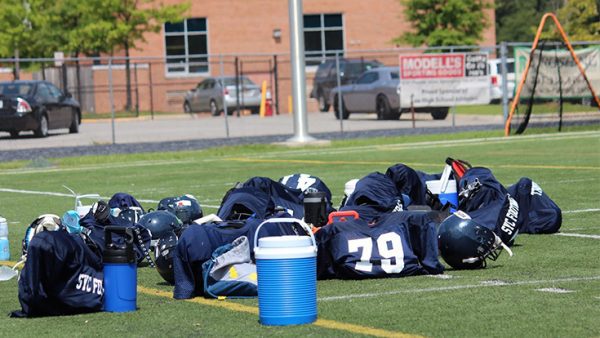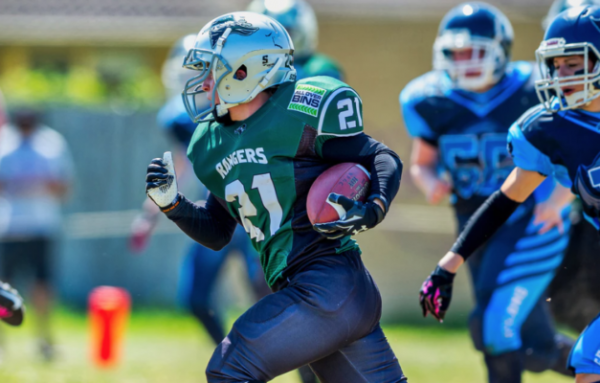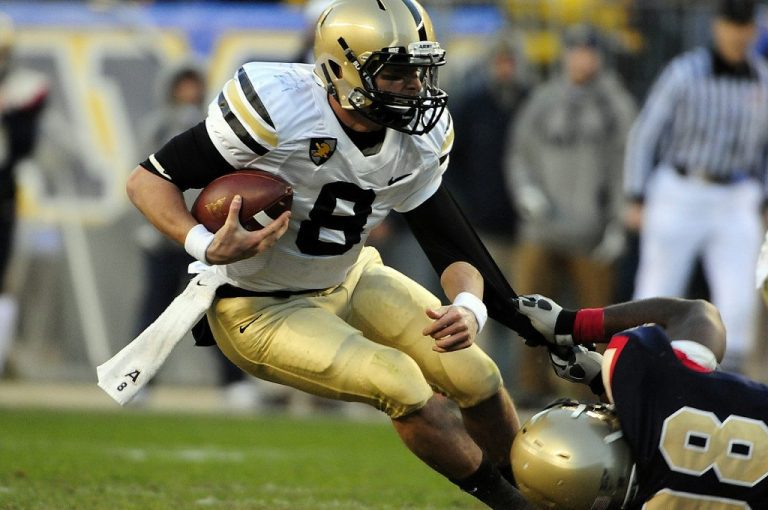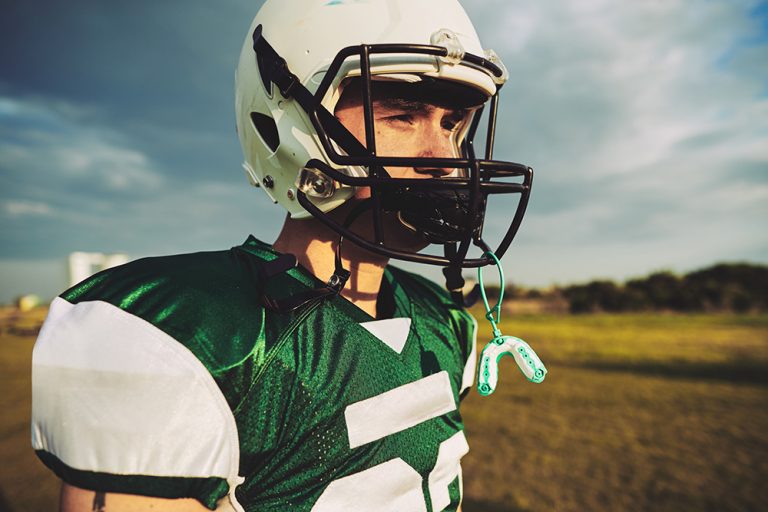How to Clean Football Equipment
Football needs essential gear like cleats, helmets, and shoulder pads. The bad odor emitting from your football equipment may contain bacteria from skin cells, sweat, and sometimes blood. The bacteria tend to grow and multiply in the equipment since it is wet, confined, and warm. To prevent staph infection, skin irritations, and MRSA, make cleaning your football gear a daily habit. Here is a guide on how to clean football equipment effectively.
Effective Ways on How to Clean Football Equipment
Cleaning Football Gloves
Football gloves are essential gear in enhancing hand safety and ball gripping. First, wipe the gloves down to remove any debris and loose dirt. This is an essential step to gloves with grass dirt. Read the instructions to check whether they are machine-washable. Add mild detergent to the water and let it mix thoroughly before soaking your gloves. If the gloves are sticky, try denture-cleaning tablets. Avoid hot water since the heat might damage the glove material.
If the gloves are machine-washable, turn them inside out to protect the outside material, enhancing the grip ability. You can place them in a lingerie bag or pillowcase before adding them to the washing machine.
Scrubbing the Gloves
Let the gloves soak in the solution until they are thoroughly wet. Using your fingertips, scrub them under water paying attention to stained areas. You can also put the gloves on and clean them in a similar way you wash your hands. Do not use abrasive materials to avoid destroying the grip and any other sensitive part of the glove. After removing all the dirt, clean them one last time and rinse to remove all the soap. Squeeze them over the sink or bucket to draw out as much water as you can. Air-dry them on a rack, flat surface, or cloth line.
Proper Care Between Washes
It is essential to treat your gloves well. Once you take the gloves off, try bunching a piece of newspaper in each glove. The newspaper draws away moisture, prevents bad smell, and dries them faster. After every match or practice, allow your gloves to dry well to avoid cleaning stuck stains.
Establish a Rotation
Start the football season with two pairs of gloves. Ensure each pair dries well between uses. Having an extra pair allows you to clean the dirty one without fear of missing a match. Also, with two pairs of football gloves, there is increased durability.
How to Get Rid of Bad Smells in Football Gloves
Football gloves get sweaty during practices and games. The wish of every player is to keep his football gloves clean and dry to prevent bad odors. The following are methods on how to get rid of bad smells in football gloves.
Warm water and Woolite: add mild Woolite soap in warm water and mix them thoroughly. Scrub the gloves gently, especially in the soiled areas. Rinse and squeeze to get rid of any excess water. Dry the gloves in a flat area and store your gloves well.
Use of sportsGemz: it features non-toxic, natural pouches that fit well in the gloves, equipment bags, and shoes. The product is unscented, making it suitable for all players, especially those with allergies. To renew the pouches, you can place them out in the sun every six months.
Denture cleaner tablet: add denture-cleaning tablets in a sink or bucket full of water. Clean the gloves thoroughly and allow them to dry on a flat surface.
Soak the smelly gloves with tea bags: tea bags have other uses apart from brewing the hot drink.Put several unused teabags in the gloves. They will get rid of the bad smell, keep your gloves dry andfresh all through.
Spraying football gloves with alcohol: it does not work on the leather made gloves. Alcohol spray deodorizes the gloves and keeps them fresh throughout the entire season.
Stuffing with dryer sheets: in between matches, add a dryer sheet to each glove. Dryer sheets come in different fragrances, and you can select the best for your gloves. Ensure to replace the sheets after every match or practice to maintain the freshness of football gloves.
Freezing: place the gloves in a plastic bag and keep them in a freezer throughout the night. Allow the gloves to soften before wearing to avoid cracking the material and feeling uncomfortable in the field.
Filling with Newsprint: this is the simplest method as it involves old newspapers. Stuff them into your football gloves to absorb bad odor and moisture. To keep the gloves smelling fresh, change the newsprint after few days.
Cinnamon and Borax odor remover: begin with a clean old rag. Add a pinch of cinnamon on top of the rag and a small amount of borax laundry booster in the middle. Tie the rag, put it in the glove, and repeat the procedure in the other glove.
How to Restore the Grip After Cleaning?
Football revolves around catching, throwing, and holding onto the ball. Gloves with less or no grip will falter your game. Here are ways to ensure your football gloves maintain a strong grip.
- Spit: at times, the old-fashioned way can be the easiest option to regain the stickiness. The method works best if the gloves are completely dry. Spit on them and use the pads to dry excess moisture on your hands. You can repeat the process in between matches to promote high performance.
- Wipe: before the match, take a baby wipe or a Clorox and wipe down all the glove parts. After, rub them against each other to increase the stickiness.
- Sun: keeping football gloves sticky is difficult for sweaty hands. Dry them in the sun before the game to restore their grip.
- Grip spray: manufacturers design several products to make grip tackier on match day. Ensure you check with the rulebook to confirm the right product for your gloves.
With such tips, you can never experience fumbles or ball slip. You will have the opportunity to take your game to a high level.
Cleaning Cutters Football Gloves
Football players look good on custom gloves. They feature excellent grip and the ability to handle hard tackles. Their durability is another feature that makes them popular. Cutter’s glove is tacky and tough enough to survive the grind. Besides, what would be the point of purchasing football gloves that will need replacement every season or after a few weeks?
Cleaning cutters custom gloves is an easy and quick process. First, wipe them down with a moist towel to restore the vibrant colors and tackiness of the C-TACK grip. Football gloves get stained with dirt and grass during matches. Failing to attend to them might damage their quality.
Cutters gloves must be machine-washed and dried. Always use non-bleach detergent and cold water to promote better results. Perform the process after every match so that the gloves can maintain their spiky look. To get rid of bad odor, use anti-bacterial denture cleansers like Efferdent and dump the gloves in the dryer on low heat.
Cutters’ football gloves come with different color combinations and high-quality material that can last the entire season. If you follow the right cleaning and maintenance techniques, you will feel, look, and participate at a higher level.
Cleaning Football Helmets
Helmets have greater risks of harboring bacteria. Football helmets are not something you dump in the washing machine with household detergents.
Cleaning helmets with removable pads
Remove the pads and keep them aside. Use a soft cloth, warm water, and Motorex to clean the helmet shell and chinstrap. Rinse thoroughly and dry with a paper towel. To clean the pads, mix warm water with mild home detergent and wipe the pads gently using a soft cloth. Let them dry and use Helmetex spray to kill the remaining bacteria. Once all the parts are dry, reassemble your helmet and store it in the right place.
Helmets with non-removable pads
Clean the helmet inside and out using a soft cloth, warm water, and mild detergent. Ensure to get in between the pads inside the helmet. Since you cannot reach all the bacteria, use stain removing spray and let it dry while sitting upright. Keep your helmet away from bright sunshine or heat to prevent pads’ degradation.
Safety tips
- Abrasive cleaning pads might damage the interior surface and scratch the outer surface of the helmet.
- Strong detergents can cause skin irritations or leave harsh residues on the helmet.
- Ensure you remove dirt, loose mud, and debris with a dry paper towel before cleaning
- Replace torn straps or missing hardware
Cleaning Football Shoulder Pads
Shoulder pads need to dry after every game or practice to reduce mold and bacteria growth. Your cleaning frequency can reduce to once or twice a week if you allow them to dry well after a match.
Use a soft cloth dampened with water to remove any visible dirt. Remove the plastics pieces covering the pads and use Extreme Odor Eliminator spray to enhance a fresh smell. Let the pieces dry completely. After cleaning loose dirt, you can improve the sparkle of your shoulder pads in the following ways:
- Apply krud Kutter to stained areas and let it for about 20 minutes
- Place the pads in pillowcases and knot the ends to not flip around in the washing machine.
- Allow your shoulder pads to dry in a hanger or cloth line.
- Use cleaning detergents like the amazing Whip-It. chlorine bleach and fabric softeners might damage your pads
Cleaning Football Jerseys
Most football jerseys are made of synthetic fabric or polyester. Such materials are easy to clean and dry. However, they need extra safety while cleaning since they have heat-pressed decals like logos.
Remove stains by hand.
Before you dump your jersey in the washing machine, ensure to remove loose stains like sweat. Tough stains like blood, grass, or beer are difficult to clean. Here are tips you can follow to get rid of such stains.
- Soak the stained area in cold water
- Apply stain removing agents like a tide
- Rub it gently using a soft-bristled brush or stain removing sponge
Cleaning the jerseys
Clean the white jerseys separately since other colors might bleed. Do not clean your football jerseys with blue jeans to prevent blue streaks from appearing on your jerseys. Before you place the jerseys in the washing machine, turn them inside out to avoid abrasion of wordings and logos.
Use cold water and powdered detergents like hero washing powder to clean your football jerseys. Hot water might cause shrinking, fading, or damaging the decals. Liquid detergents do not mix well with water, and the remaining elements can damage your jersey.
How to Dry Football Jerseys
After cleaning the jersey, turn its right side out and shake to prevent the labels from sticking together. Cover the jersey with a thin fabric while trying to protect it from the sun’s excessive heat. Do not use a dryer as the high heat can melt or crack the numbers. Also, avoid ironing your football jersey to avoid similar results.
Cleaning Football Cleats
Football cleats accumulate more dirt. You should clean them more often, just like the other gear. You cannot escape mud or dirt, especially when playing on grassy fields. Start by shaking off the excess dirt. Brush off the hard dirt, especially at the bottom of your cleats, using Popsicle sticks. Using a clean cloth, wipe any remaining dirt.
Regular cleaning improves the lifespan of your cleats. Use a soft-bristled brush and vapor fresh detergent to clean the upper part of the cleats. Do not dip them in water to avoid cracking the leather material. Hot water can also damage the material. If your cleats are leather made, use leather conditioner and leather food to keep their natural oils.
Cleaning the soles
After the match, immediately take off your cleats and heat them against each other to remove excess mud. Once you get home, use a dry scrub to remove the remaining grime on the soles. Avoid using sticks since they might scratch the soles.
Cleaning the upper part
First, run the laces under tap water and place them on a towel to dry. Use a soft toothbrush to scrub the upper parts of your cleats. With the laces removed, get to every part, especially the cleats’ tongue. Also, you can use an eraser sponge to clean the upper parts of your cleats.
How to Dry Football Cleats
Adequate air circulation in the cleat is essential. Try stuffing some newspaper inside the cleat and let it draw all the moisture. Using a blow dryer might unstick the glue holding the cleats together. Once they are dry, you can try the following tips to give cleats a fresh smell:
- Soak paper towels in bleach and put them in each cleat
- Dip a cotton ball in alcohol and use it to wipe the inside of the cleat
- Put unused teabags in the cleats.
- Place a dry sheet in each cleat.
Cleaning Football Socks
Football socks collect dust that makes cleaning a hard process. There are several ways on how to clean football socks. You can choose the easy technique or the one that works best for your socks. In this article, we have highlighted several steps to cleaning football socks.
Using a Washing Machine
First, separate the white socks from other colors to prevent bleeding that may discolor the white socks. Use stain-removing products like Tide Ultra Stain Release Liquid to get rid of tough stains. You can soak the socks or apply the detergent on the stained area. You can also mix warm water with a small amount of Oxiclean powder and soak the stained socks for a few hours or overnight.
There are various home remedies to clean different kinds of stains. You can sprinkle a pinch of salt on red wine stains or use hairspray on ink stains before cleaning. Also, you can use a 1:2 mixture of dishwashing liquid and hydrogen peroxide.
Turn your socks inside out and pin each pair together before placing them in the washing machine. To avoid fading or stretching, you can add mild laundry detergent.
Hand-washing
Separate white socks from others and wash each pile separately. Use stain removers like Espro sports cleaner to get rid of stains. Ensure you follow the instructions on the product. Hot vinegar is essential in removing grass stains. If your socks are excessively dirty, let them soak in the soapy solution for about 30 minutes. This will help loosen all dirt. Do not scrub or twist your socks to avoid damaging or stretching the material.
How to Dry Football Socks
Roll your socks in a towel and press the water out to fasten drying. Do not wring them since it may stretch or damage the fabric. Hang the socks on a clothe rack or clothesline and let them dry completely. If you decide to use a dryer, set it on gentle mode to avoid damaging the fabric fibers. Once your socks are completely dry, fold each pair together and store them properly.
Safety tips
After the match, do not staff football socks in the dressing room. Remove the kit bag’s socks and attend to them immediately if the field was muddy and wet. Wet socks get stickier and smelly when left in the bag.
Do not mix jerseys and shorts with socks. Football socks must benefit from fabric softener to prevent to protect the fabric from stretching.
Too many pairs in the washing machine will re-deposit dirt. High temperatures are only suitable when cleaning tough stains. The right temperature will improve the durability of your socks.
How to Clean Football Mouthguards
Mouthguards easily get contaminated with germs, bacteria, mold, staph, and strep. If you wear a mouth guard frequently, you need to learn how to clean it. Without proper care, they become a breeding site for bacteria.
Cleaning your mouthguard every morning prevents mold and bacteria growth. Also, it gets rid of bad smell and improves durability. Manufacturers advise that you try different cleaning techniques and choose the best for you.
Different ways to clean
Non-alcoholic cleaners such as DentaSoak are available. They will give your guard a fancy look in a simple soak.
Using a toothbrush and toothpaste is another way of cleaning a mouthguard. The toothpaste should not be abrasive, while the toothbrush should be soft-bristled. Brush the guard, rinse it properly, and let it dry before storage.
Using soap and water is another effective way of cleaning football mouth guards. If you decide to use soap and water, include anti-bacterial cleaning detergents like a fresh guard.
Storing your mouthguard
After cleaning and drying the guard, keep it in a ventilated case. Also, the case must be ventilated to enhance the constant flow of air. The storage space should be moisture-free. Ensure you also clean the case to prevent bacteria from spreading.
How to Clean Football Girdles
Girdles tend to outdo when sweat accumulates after excessive training. Cleaning girdles can be a challenging process. However, with the right products and techniques, you can give your girdle a fancy look.
Girdles feature a fragile material, and therefore you should be careful with their cleaning. Also, football girdles are different. Try several techniques to ensure you find the right one for your girdles. Clean the girdles separately from other gear using extra-strong products like carpet cleaner—dry your girdles in a cool place. Using a dryer or direct sunlight can shrink the material of the girdle.
The secret to successful stain removal is getting the correct product combination. Some designers will advise that you avoid certain products depending on the type of girdle.
Conclusion
Cleaning your football gear should be a routine. Learn to take care of the football equipment designed to take care of you. Do not allow bacteria growth that can lead to skin irritation, MRSA, and Staph infection.
- Best Football Gloves for Running Backs 2023 - June 29, 2023
- Top Best TV For Watching Football (2022 Buying Guide) - November 21, 2022
- 13 Top Best Football Shoulder Pads in 2023 (Buying Guide) - August 3, 2022





